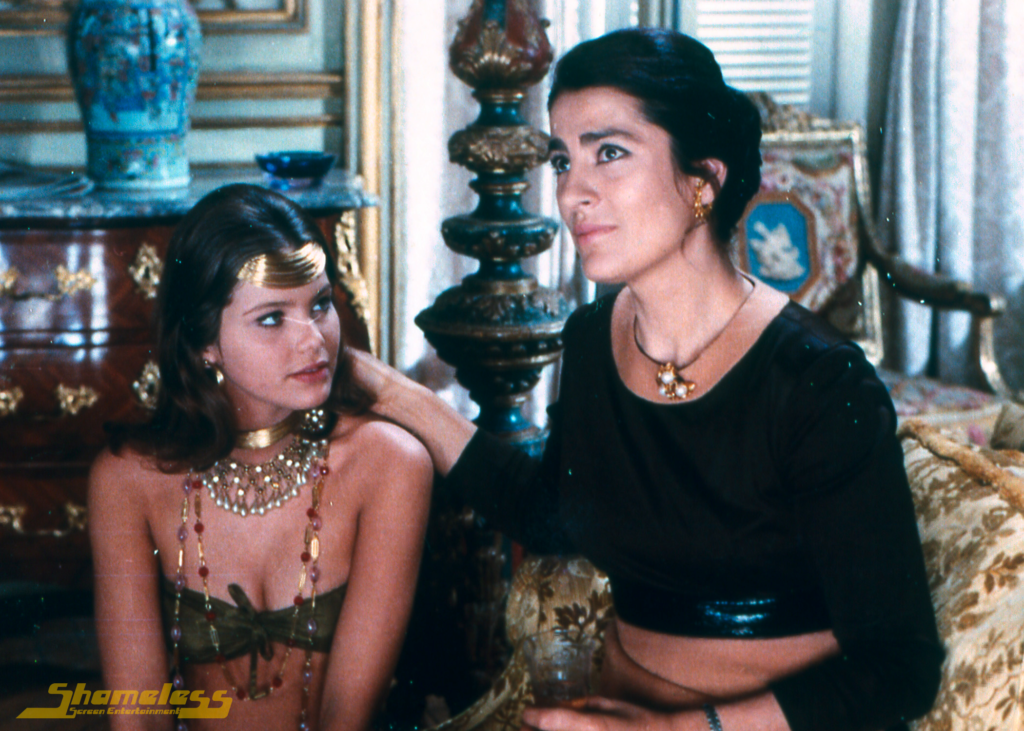
Shameless are saddened to learn of the passing of Greek actress, Irene Papas, who died today aged 96 after a prolonged battle with Alzheimer’s disease.
Born in 1926 in the small village of Chiliomodi in Corinthia in Greece, Papas rose to prominence as a singer and dancer before transitioning into the theatrical world, a decision likely informed by her parent’s own involvement in the arts — her father a teacher of classical drama. Papas, who had trained as an actress in Athens, undertook performances in many of the Greek classics including Medea and Electra alongside contemporary theatrical productions. Like many of her peers, Papas made the transition to the silver screen in the late forties, debuting in Nikos Tsiforos’ Fallen Angels and acting in further Greek productions such as Frixos Iliadis’ Dead City in 1951.
Due to the burgeoning successes of the Italian film industry in the 1950s, Papas sought work in the studios of Italy. Her first film in this period, Mario Monicelli and Steno’s Le infedeli (1953) gave her the opportunity to work with esteemed icon of Italian cinema, Gina Lollobrigida. Further cinematic roles in Italy allowed Papas to work with other Italian cinematic greats such as Totò in Aldo Fabrizi’s Una di quelle (1953) and Sophia Loren in Pietro Francisci’s Atilla the Hun in 1954. Atilla the Hun would become representative of Papas’ work during this period which comprised of numerous pepla – films borne from the Italian craze for Sword and Sandal epics. Other such roles in the filone included Riccardo Freda’s Teodora, imperatrice di Bisanzio in 1954 and the popular television mini-series the Odyssey in the 1960s. Papas’ striking Grecian beauty made her the perfect fit for such historically based roles, echoed in her performances in other historical fare such as Anne of the Thousand Days (Charles Jarrott, 1969) and The Trojan Women (Michael Cacoyannis, 1971).
By the 1960s, Papas had become an internationally renowned actress, a reputation gained via her roles in films such as The Guns of Navarone (J. Lee Thompson, 1961) and Zorba the Greek (Michael Cacoyannis, 1964). This period was also marked by other Greek productions such as Yorgos Tzavellas’ Antigoni (1961) and Michael Cacoyannis’ cinematic adaptation of Electra in 1962 with the titular role reprised by Papas, which she had previously played in her days treading the theatrical boards.
Papas was an ardent supporter of the Greek Communist Party and like many of her compatriots was exiled to Italy in the late sixties due to her opposition of the far-right military junta who took control of Greece in 1967. As a result of her exile, Papas garnered strong links with Italy — a country she had found acting success in in the 1950s — continuing to work within the country’s film industry in the 1960s and 1970s in political films such as We Still Kill the Old Way (Elio Petri, 1967) to thriller fare such as Oasis of Fear and Don’t Torture a Duckling (Lucio Fulci, 1972). In 1969, Papas had a prominent role in Costa-Gavras’ Z as the wife of Yves Montand’s Z, Hélène. Z was a deeply political work that showed Papas’ commitment to her political ideology on screen and her performance garnered international acclaim for the Greek actress.
Papas’s acting career continued throughout the 1980s and 1990s, mostly contained to television productions as was par the course for actors working in Italy during this period. Her last on-screen role was in 2004 in Ecuba, a film based on the Greek tragedy Euripides which she co-directed with Giuliana Berlinguer.
In Papas’ death, we remember an exceptional actress with an ardent commitment to her political beliefs and civic commitment. A true cinematic Grande Dame.
Papas’ performance as Barbara Slater in Lenzi’s Oasis of Fear is available to stream at https://www.shameless-films.

FACEBOOK
Join us on facebook for announcements. sneak peaks and more
follow us
TWITTER
We tweet about films, upcoming releases and other interesting offers
follow us